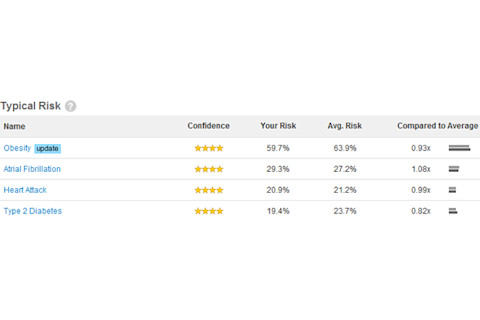I do talk periodically on this weblog about the coming 'transparent society.' The main reason I bring up the issue is that I think it is probably inevitable, and, I think we're sliding toward it without even reflecting on it too much. Many people are very surprised at how little time it takes to find information on them in Spokeo and Pipl. Curious about where someone you lost touch with from high school has lived? Go to Intelius. Rereading David Brin's original 1996 essay introducing the idea in Wired I'm struck by the fixation on old-fashioned cameras. To me, what people do is almost less interesting than what they've done. How much did they buy their house for? Where did they go to university? Did they graduate? Who did they marry? Interestingly, much of this information is offered up freely by the individuals themselves.And yet what about our genetic code? With the recent 23andMe sale (which continues on, with provisions) I noticed people on Facebook worrying about privacy. Interestingly WikiLeaks has revealed that American diplomats were encouraged to obtain the DNA of foreign notables. Why would they do this? My first thought was that perhaps it would be an easy way to blackmail powerful cuckolds! Though this didn't seem to cramp Adnan Kashoggi's style. I assume that powerful individuals don't have to worry about divulging their disease risks, since they'll be taken care of. But the reality is that the science is simply not there for a great deal of return when it comes to risk variants. Below is a screenshot of my risks for various diseases from 23andMe as judged from a few single nucleotide variants:

First, these are risks assuming a European genetic background. Which I don't have. So there's a problem right there, but 23andMe helpfully notes this boldly if you click through. But setting that aside, I know my risks for Type 2 Diabetes are much greater than average. Why? I have a family history of the disease! That's why I'm obsessed with visceral fat. The point is that right now family history is a much better predictor of your risks of a given disease than anything else. Not only does this capture missing heritability, but there is a natural correlation between families and environmental risk factors (or lack thereof). Using the breast cancer risk assessment tool it seems that if you have one first-degree relative who has had the disease you double your own odds of coming down with it over a five year period (though the risks over any given five year period are still low). There has been a lot of warranted attention paid to the
genes, but what about the ability of insurers to digitally analyze the obituaries of your relatives and predict your own probability of death and disease? I'm not saying that one shouldn't be worried about divulging one's genetic data. But it's only a small piece of the puzzle of what we're losing.













